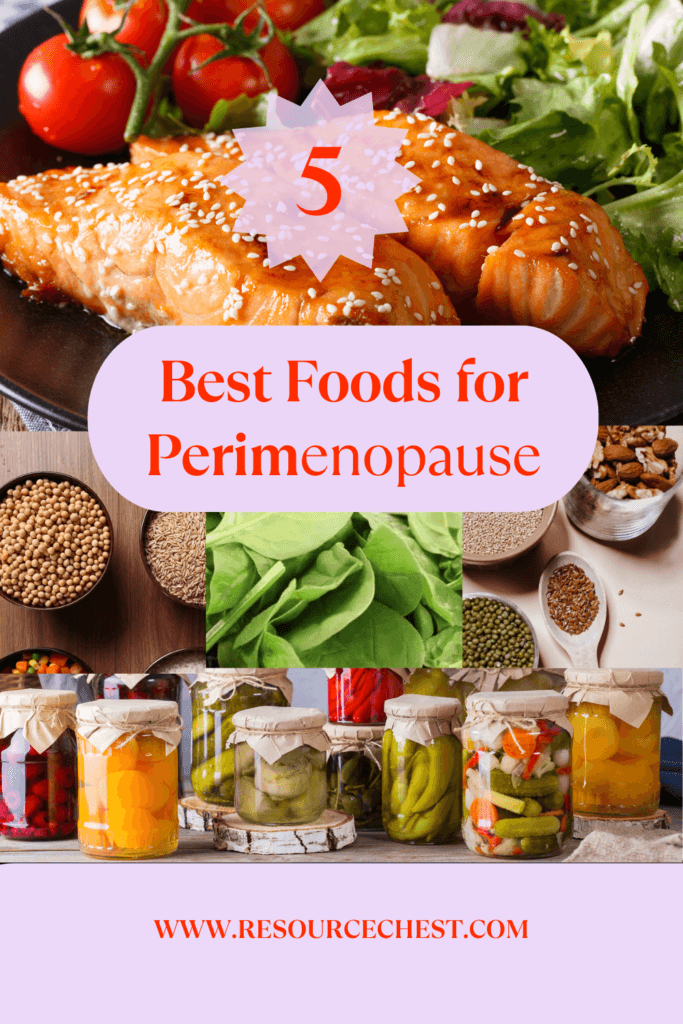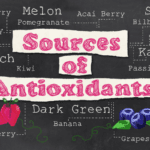5 of the Best Foods for Perimenopause
Perimenopause, the transitional phase before menopause, can bring about a range of physical and emotional changes in a woman’s life. While these changes are a natural part of the aging process, they can be managed effectively through a combination of lifestyle adjustments, including a healthy diet. In this article, we will explore five of the best foods for perimenopause, which can help alleviate symptoms and support overall well-being during this phase.

1 – Leafy Green Vegetables: Leafy green vegetables are not only low in calories but also rich in vitamins, minerals, and fiber. Spinach, kale, Swiss chard, and other dark leafy greens are excellent sources of nutrients that support hormonal balance and overall health during perimenopause. These vegetables are particularly high in B vitamins, such as vitamin B6, which is involved in the production of serotonin—a neurotransmitter that regulates mood. Adequate intake of B vitamins can help alleviate symptoms of anxiety and depression that may arise during this transitional phase.
Moreover, leafy greens are abundant in calcium, magnesium, and vitamin K, which are essential for maintaining strong bones. As estrogen levels decline during perimenopause, the risk of osteoporosis increases. Including leafy greens in your diet can contribute to bone health and help reduce the risk of fractures.
2 – Omega-3 Fatty Fish: Omega-3 fatty acids are known for their anti-inflammatory properties, and incorporating them into your diet can provide relief from various perimenopausal symptoms. Fatty fish such as salmon, mackerel, and sardines are rich in omega-3s, particularly the types called EPA and DHA. These fatty acids support hormonal health and have been associated with a reduction in hot flashes and mood swings.
Furthermore, omega-3s offer cardiovascular benefits by improving cholesterol levels, reducing blood pressure, and decreasing the risk of heart disease. They also support brain health and cognitive function, which can be affected by hormonal changes during perimenopause. Including omega-3 fatty fish in your diet a few times a week can provide substantial benefits for both physical and mental well-being.

3 – Fermented Foods: The gut microbiome plays a crucial role in maintaining hormonal balance and overall health. Fermented foods like yogurt, sauerkraut, kefir, and kimchi contain live bacteria known as probiotics. These beneficial bacteria help restore and maintain a healthy balance of gut flora, supporting digestion, nutrient absorption, and immune function.
During perimenopause, changes in hormone levels can impact gut health, leading to digestive issues such as bloating and constipation. Including fermented foods in your diet can help alleviate these symptoms and promote a healthy gut environment. Probiotics also contribute to vaginal health by maintaining the natural balance of bacteria in the urogenital tract, reducing the risk of yeast infections and urinary tract infections, which can be more common during perimenopause.
4 – Nuts and Seeds: Nuts and seeds are nutrient-dense foods that offer a wide range of benefits for women in perimenopause. Almonds, walnuts, flaxseeds, and chia seeds are particularly noteworthy for their hormonal health benefits. These foods provide essential fatty acids, including omega-3s and omega-6s, which are important for hormone production and balance. They also contain fiber, vitamin E, and minerals such as magnesium and calcium.
Fiber-rich nuts and seeds can help regulate blood sugar levels and support weight management—a common concern during perimenopause. They promote feelings of fullness, reducing the tendency to overeat or snack on unhealthy options. Additionally, the vitamin E content in nuts and seeds supports skin health, as declining estrogen levels can contribute to dryness and other skin-related issues during perimenopause.
Magnesium, present in almonds, flaxseeds, and chia seeds, is involved in more than 300 enzymatic reactions in the body, including those related to mood regulation and stress management. Consuming these foods can help reduce irritability, improve sleep quality, and support overall emotional well-being during perimenopause.
5 – Whole Grains: Choosing whole grains over refined carbohydrates is an important dietary adjustment during perimenopause. Whole grains, such as quinoa, brown rice, oats, and whole wheat, offer numerous benefits due to their higher fiber and nutrient content compared to refined grains.
The complex carbohydrates found in whole grains provide sustained energy and help stabilize blood sugar levels, preventing energy crashes and mood swings. These carbohydrates are slowly digested, providing a steady release of glucose into the bloodstream. Stable blood sugar levels can contribute to better mood stability and reduce the risk of irritability and fatigue.
Whole grains also contain B vitamins, including vitamin B6 and folate, which are involved in the synthesis of neurotransmitters that regulate mood and promote mental well-being. These vitamins are essential for serotonin and dopamine production, neurotransmitters that play a significant role in managing stress, anxiety, and depression.
Maintaining a well-balanced diet is crucial for managing symptoms and supporting overall well-being during the perimenopausal phase. Incorporating nutrient-dense foods such as leafy green vegetables, omega-3 fatty fish, fermented foods, nuts and seeds, and whole grains can have a positive impact on hormonal balance, reduce inflammation, support gut health, and enhance mood stability. While these foods are beneficial for most women in perimenopause, it’s important to consult with a healthcare professional or a registered dietitian to personalize your diet plan based on your specific needs and health condition. By nourishing your body with these wholesome choices, you can navigate perimenopause with greater ease and embrace this transformative phase with optimal health.

